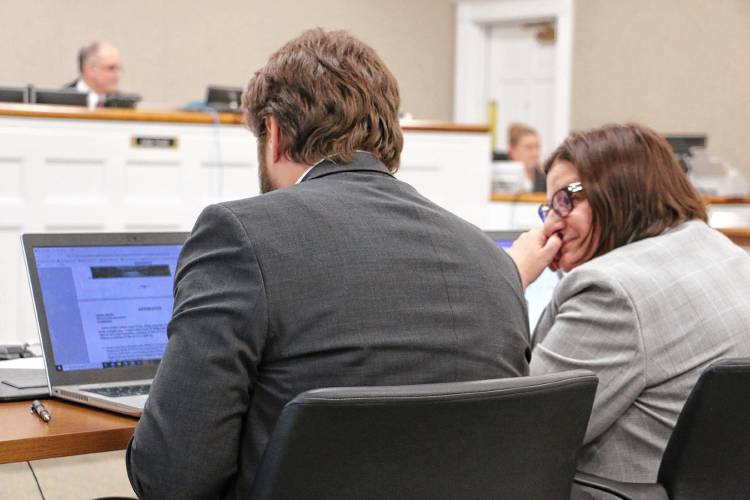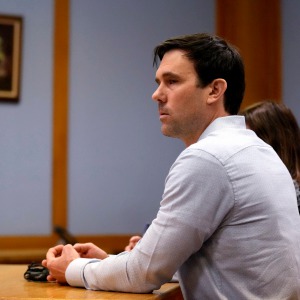Editorial: Vermont struggles with juvenile justice

Addison County State’s Attorney Eva Vekos, right, at a hearing in Addison County Superior criminal court on Tuesday. Vekos charged a 14-year-old Burlington boy with second-degree murder in the fatal shooting of a 14-year-old Shelburne, Vt., boy. Judge David Fenster is pictured in the background. (Pool photo - Kevin McCallum/Seven Days)
| Published: 11-14-2023 10:41 AM |
The pending case of a 14-year-old Burlington boy charged with fatally shooting another young teenager in Bristol, Vt., last month demonstrates that the state of Vermont continues to fail spectacularly in its duty to young people caught up in the criminal justice system.
When the defendant was arraigned in Addison County Superior Court’s criminal division, State’s Attorney Eva Vekos initially asked that he be held without bail, but changed her mind when she heard that the only options for doing so were unacceptable. The boy would be sent to an adult prison, where he would either be held in what amounted to solitary confinement; or be allowed to interact with the adult population. In either scenario, the suspect’s mental and/or physical well-being would be at risk, so he was eventually released to the custody of his family.
How did this situation arise? Since the house of horrors that was the Woodside Juvenile Rehabilitation Center in Essex was shuttered in 2020, the state has had no secure facility to detain youths involved in the justice system. The alternative weekly Seven Days recently reported in gruesome detail the brutality of Woodside’s regime of punishment, isolation and violent restraint. The problems there were evident at least as far back as 2015, when our colleague Jim Kenyon reported on conditions at the facility. That the state turned a blind eye to the warning flags he and others raised is shameful.
However, the idea that youth involved in the justice system, no matter how troubled, need treatment by humane and skillful staff has not caught on in all quarters. In recent legislative testimony, Steve Howard, executive director of the Vermont State Employees Association, called the absence of adequate placements for youth “a public safety crisis” and sought the intervention of the National Guard. This egregious proposition was rejected out of hand by Gov. Phil Scott and Defender General Matt Valerio, who correctly termed it a reckless attempt to inflame public opinion.
That doesn’t mean that the situation isn’t pressing, however. The state’s plan to solve it involves opening four smaller facilities offering therapeutic services. One, a four-bed secure unit in Middlesex, probably won’t be ready until the spring; another proposed for Newbury is tied up in court. And Vermont’s youth and family advocate has described the plan as thin on details and apparently drafted without sufficient data.
To return to the current case, the decision by Vekos, the prosecutor, to charge the boy as an adult has been subject to scrutiny. The defendant is charged with second-degree murder, involuntary manslaughter and aggravated assault, to which he has pleaded not guilty.
The severity of the charges is one issue. From what information has become public so far, it appears that the defendant was waving around a pistol in the back seat of a car when it discharged, killing 14-year-old Madden Gouveia, of Shelburne, who was sitting in the front seat alongside the 18-year-old driver. Marshall Pahl, the state’s deputy defender general who is the boy’s lawyer, said, “This is a case where the allegation is one of essentially tragic carelessness.”
If that proves to be accurate, then the appropriate venue for adjudicating the case is Family Court, where the proceedings are closed and the disposition sealed. And the law provides a mechanism for that transfer to take place.
Article continues after...
Yesterday's Most Read Articles
 Herd departs Hartford’s last remaining dairy farm
Herd departs Hartford’s last remaining dairy farm
 Kenyon: What makes Dartmouth different?
Kenyon: What makes Dartmouth different?
 At Dartmouth, hundreds protest ongoing war in Gaza and express support for academic freedom
At Dartmouth, hundreds protest ongoing war in Gaza and express support for academic freedom
 Editorial: Parker parole a reminder of how violence reshapes our lives
Editorial: Parker parole a reminder of how violence reshapes our lives
 A Life: Richard Fabrizio ‘was not getting rich but was doing something that made him happy’
A Life: Richard Fabrizio ‘was not getting rich but was doing something that made him happy’
But once the defendant is arraigned as an adult in criminal court, the provisions that normally shield a juvenile’s identity do not apply. Even if the case is eventually remanded to juvenile court, his identity would remain public — even if the proceedings there are closed and the disposition sealed. In other words, the bell cannot be unrung, which has major implications in the age of Google and Facebook. (VtDigger, whose coverage was published in the Valley News, has chosen not to name the boy at this point, perhaps reasoning along the same lines.)
But it should be noted in Vekos’ behalf that the relevant Vermont statute provides that when juveniles are alleged to have committed serious crimes, cases are presumed to start in adult criminal court, unless the prosecutor files a youthful offender petition directly in Family Court.
As the current case makes clear, the default option ought to be beginning all such proceedings in Family Court until the prosecutor and a judge determine whether the facts warrant a transfer to adult criminal court or that the interests of justice would be better served by continuing in Family Court. In the case of most young people who have made serious mistakes, the traditional object of the system has been rehabilitation without the lifelong consequences that come from a public trial and conviction. That remains a valid goal.

 Editorial: Chris Sununu’s moral vacuum
Editorial: Chris Sununu’s moral vacuum Editorial: Gambling tarnishes America’s sporting life
Editorial: Gambling tarnishes America’s sporting life By the Way: A white nationalist’s many mistruths
By the Way: A white nationalist’s many mistruths
